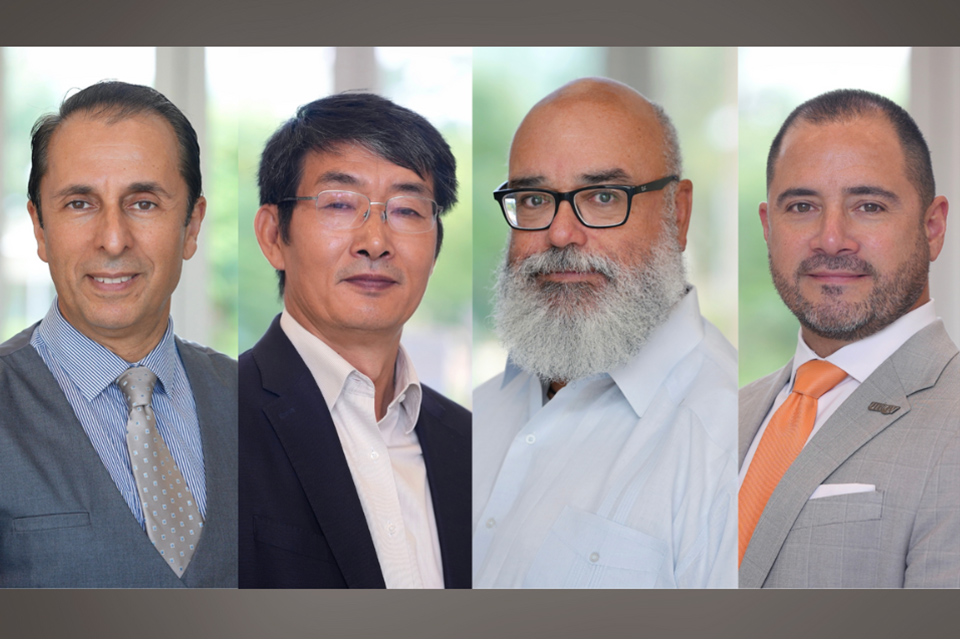By Maria Gonzalez
RIO GRANDE VALLEY, TEXAS – SEPT. 10, 2025 – The University of Texas Rio Grande Valley has been selected as one of 10 finalists in the Gulf Futures Challenge, a competitive program of the National Academies of Sciences, Engineering, and Medicine in partnership with Lever for Change.
UTRGV’s finalist project is titled RESCUE, Renewable Energy for Sustainable, Continuous, Uninterrupted Ecosystems. As a finalist, the university will receive $300,000 in planning funds.
The $50 million program drew 164 applications from organizations in Alabama, Florida, Louisiana, Mississippi and Texas. Each finalist team receives $300,000 in project development support, and two finalists will receive $20 million.
“As the public university for the Rio Grande Valley, our responsibility is to improve quality of life and support the health, safety and economic future of the communities we serve,” UTRGV President Guy Bailey said. “This recognition reflects the work our faculty and staff are leading with partners to improve energy security for families, underserved communities and businesses across the region.”
The project’s goal is to strengthen energy infrastructure with built-in redundancy and resilience so Gulf Coast communities can overcome energy insecurity and unlock economic stability, healthier living conditions and greater climate resilience.
“RESCUE's mission is to advance energy resilience by building redundancy that addresses infrastructure gaps in capacity and reliability, driving economic development and long-term sustainability, and ultimately strengthening community resilience,” said Dr. Can Saygin, senior vice president for Research and dean of the Graduate College.
The project will also focus on energy reliability for underserved communities and critical infrastructure by integrating diverse energy sources, including fossil fuels, wind and solar, with battery energy storage systems (BESS), while building local capacity to operate and sustain those systems.
RESCUE will pursue the following actions through a socio-technical framework:
- Deploy battery energy storage systems in underserved communities.
- Build a pilot battery manufacturing facility for local production.
- Run an applied research testbed linking storage with wind and solar.
- Partner with local governments and community leaders on policy and planning.
- Provide workforce training for clean energy jobs and manufacturing skills.
- Develop a roadmap for storage, wind and solar deployment.
- Engage communities in planning and preparedness to ensure solutions fit local needs.
- Build trust so communities can participate fully in energy initiatives.
The project addresses persistent service interruptions and recovery gaps across the Texas Gulf Coast, including the Rio Grande Valley, where energy grid fragility has created major challenges. It is designed to reduce outage time, improve grid stability and support community health and economic activity during and after disasters.
“Regional studies show strong concern about weather related power loss among lower income households and longer waits for restoration after severe storms,” Saygin said. “A recent survey showed that 90% of residents have concerns about losing power due to weather-related outages, with lower-income households unable to bear the economic, social and medical burdens of unreliable power.”
“Funding of this project will allow us to build an energy microgrid testbed at UTRGV for applied research and development and provide workforce training needed for operating and maintaining these systems,” Saygin said.
He said involving communities in planning, deployment and training moves resilience efforts beyond technical fixes, making them a shared social project that leads to regional prosperity.
With a $20 million award, UTRGV’s five-year plan would deploy community sited battery storage, expand applied research in renewable energy and grid management, purchase production equipment for the pilot facility and support community outreach and training.
“A full award would move us from design to deployment, providing energy storage to critical infrastructure, building energy resilience in neighborhoods, standing up the pilot facility and scaling the training needed to sustain these systems,” Saygin said. “The outcome we are working toward is reliable, uninterrupted and cost-effective power that protects health and supports regional economic growth.”
The RESCUE leadership team includes:
- Can Saygin, Ph.D., principal investigator.
- Jianzhi (James) Li, Ph.D., co-principal investigator and endowed professor of Manufacturing and Industrial Engineering and director of the UTRGV Institute for Advanced Manufacturing.
- Cecilio Ortiz García, Ph.D., co-principal investigator and professor of public affairs and security studies and director of the Center for Community Resilience Research Innovation and Advocacy.
- Ron Garza, co-principal investigator and senior associate vice president for Workforce and Economic Development.
The timeline moves from pilot facility planning and equipment purchases to initial production and regional deployment. It also includes community energy workshops, policy and planning roundtables, education toolkits and listening sessions.
ABOUT UTRGV
Celebrating its 10th anniversary during the 2025-2026 academic year, The University of Texas Rio Grande Valley (UTRGV) is on a mission to transform the Rio Grande Valley, the Americas and the world. One of the country’s largest Hispanic-Serving Institutions and Seal of Excelencia certified, UTRGV has earned national recognition for its academic excellence, social mobility and student success since opening in Fall 2015. Ranked among the Best Colleges for your Tuition (and Tax) Dollars in 2025 by Washington Monthly (#7 nationally; #1 in Texas), UTRGV continues to break enrollment records, launch new academic and athletics programs and progress toward achieving R1 research status.
The only university in Texas with schools of Medicine and Podiatric Medicine, UTRGV’s regional footprint spans South Texas – with locations, teaching sites, and centers established in Edinburg, Brownsville, Rio Grande City, McAllen, Weslaco, Harlingen, Laredo, Port Isabel and South Padre Island.

